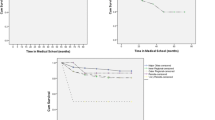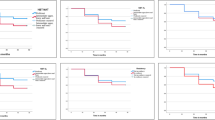Abstract.
Introduction
Racially segregated schooling, a legacy of Apartheid policies, continues to hamper education in South Africa. Students entering university from suboptimal circumstances are at significant risk of demonstrating poor academic performance and dropping out of their programmes. Attempts to address the educational needs of these students have included the introduction of extended medical programmes at several universities. Such a programme, the Academic Development Programme (ADP), was implemented at the University of Cape Town in 1991. Over the past decade the programme has graduated more than 100 students. Upon implementation of a new problem-based learning (PBL) programme in 2002, the ADP was discontinued and all students were entered directly into the new PBL programme. Students who demonstrate a need for additional academic support by the end of the first semester enter the Intervention Programme for 1 year before proceeding to the second semester of the PBL programme. An interim analysis was performed to compare the retention rates and academic performance of academically at-risk students in the new PBL programme and the ADP.
Methods
The records of all academically at-risk students entering the ADP (1991–2000) and the new PBL programme (2002) were reviewed. Retention rates for all years of study, and academic performance in the fourth year clerkship courses of the respective programmes were compared.
Results
A total of 239 academically at-risk students in the ADP and 43 at-risk students in the new PBL programme were studied. The median retention rates, per year of study, for at-risk students in the PBL programme was significantly better than for at-risk students in the ADP (p<0.02). Academic performance of the at-risk students in all the fourth year clinical clerkship courses of the PBL programme was significantly better than the mean performance over 10 years for at-risk students in the same fourth year courses in the ADP.
Conclusion
The introduction of PBL at the University of Cape Town has not had a deleterious effect on the performance of academically at-risk medical students. Interim analysis suggests that retention rates and academic performance in the PBL programme are better than those achieved in the extended traditional programme.
Similar content being viewed by others
References
Albanese M., (2000). Problem-based learning: why curricula are likely to show little effect on knowledge and clinical skills. Medical Education 34: 729–738
Albanese M.A., Mitchell S., (1993). Problem-based learning: A review of literature on its outcomes and implementation issues. Academic Medicine 68: 52–81
Berkson L., (1993). Problem-based learning – Have the expectations been met? Academic Medicine 68: S79–S88
Burch V.C., Seggie J.L., (2005). Portfolio assessment using a structured interview. Medical Education 39: 1169
Colborn R.P., (1995). Affirmative action and academic support: African medical students at the University of Cape Town. Medical Education 29: 110
Colliver J.A., (2000). Effectiveness of problem-based learning curricula: Research and theory. Academic Medicine 75: 259–266
Colliver J.A., (2002). Educational theory and medical education expertise: A cautionary note for medical school faculty. Academic Medicine 77: 1217–1220
Colliver J., (2004). Full-curriculum interventions and small-scale studies of transfer: Implications for psychology-type theory Medical Education 38: 1212–1214
Crouch L., Mabogoane T., (1997). Aspects of internal efficiency indicators in South African schools: Analysis of historical and current data Edusource 19: 4–28
Department of Education. (2003). Education Statistics in South Africa at a Glance in 2001. Department of Education Pretoria
Department of Education. (2004). Education Statistics in South Africa at a Glance in 2002. Department of Education Pretoria
Department of Education (2005). Senior Certificate Examination Report for 2004. Department of Education Pretoria
Iputo J.E., (1999). Impact of problem-based learning curriculum on the learning styles and strategies of medical students at the University of Transkei. South African Medical Journal 89: 50–55
Iputo J.E., Kwizera E., (2005). Problem-based learning improves the academic performance of medical students in South Africa. Medical Education 39: 388–393
Kwizera E.N., Igumbor E.U., Mazwai L.E., (2005). Twenty years of medical education in rural South Africa – Experiences of the University of Transkei Medical School and lessons for the future. South African Medical Journal 95: 920–924
Mennin S.P., Friedman M., Skipper B., Kalishman S., Snyder J., (1993). Performance of the NMBE I, II, and III by medical students in the problem-based learning and conventional tracks at the University of New Mexico. Academic Medicine 68: 616–624
Norman G.R., Schmidt H.G., (2000). Effectiveness of problem-based learning curricula: Theory, practice and paper darts. Medical Education 34: 721–728
Norman G.R., Eva K.W., Schmidt H.G., (2005). Implications for psychology-type theories for full curriculum interventions. Medical Education 39: 247–249
Perry H., (2005). Analysis of the subject results in the Senior Certificate Examination. Edusource 47: 13–26
Schmidt H.G., (1983). Problem-based learning: rationale and description. Medical Education 17: 11–16
Scott I., Yeld N., McMillan J., Hall M., (2004). Equity and excellence in higher education: The case of the University of Cape Town In: Bowen W., (ed.). Equity and Excellence in Higher Education University of Virginia Press Charlotteville pp. 261–284
Shindler J., (2005). An analysis of the 2004 Senior Certificate Examination Edusource 47: 1–12
Statistics South Africa (2001). http://www.statssa.gov.za/census01/Census/temp/School%20attendance%20%20province200621631161.xls Accessed 2006.02.16
Vernon D.T.A., Blake R.L., (1993). Does problem-based learning work? A meta-analysis of evaluative research. Academic Medicine 68: 550–563
Yeld, N. (2003). Academic literacy and numeracy profiles: An analysis of some results from the AARP and TELP tests of incoming students (2001/2002 entry years). In: South African Universities’ Vice Chancellors’ Association – Committee of Technikon Principals. Higher Education Admissions Project. Into Higher Education. Perspectives on Entry Thresholds and Enrolment Systems, pp. 21–52. Pretoria: SAUVCA-CPT HE Admissions Project
Wood D.F., (2003). ABC of learning and teaching in medicine. Problem based learning British Medical Journal 326: 328–330
Author information
Authors and Affiliations
Corresponding author
Rights and permissions
About this article
Cite this article
Burch, V., Sikakana, C., Yeld, N. et al. Performance of Academically at-Risk Medical Students in a Problem-Based Learning Programme: A Preliminary Report. Adv Health Sci Educ Theory Pract 12, 345–358 (2007). https://doi.org/10.1007/s10459-006-9006-6
Received:
Accepted:
Published:
Issue Date:
DOI: https://doi.org/10.1007/s10459-006-9006-6




